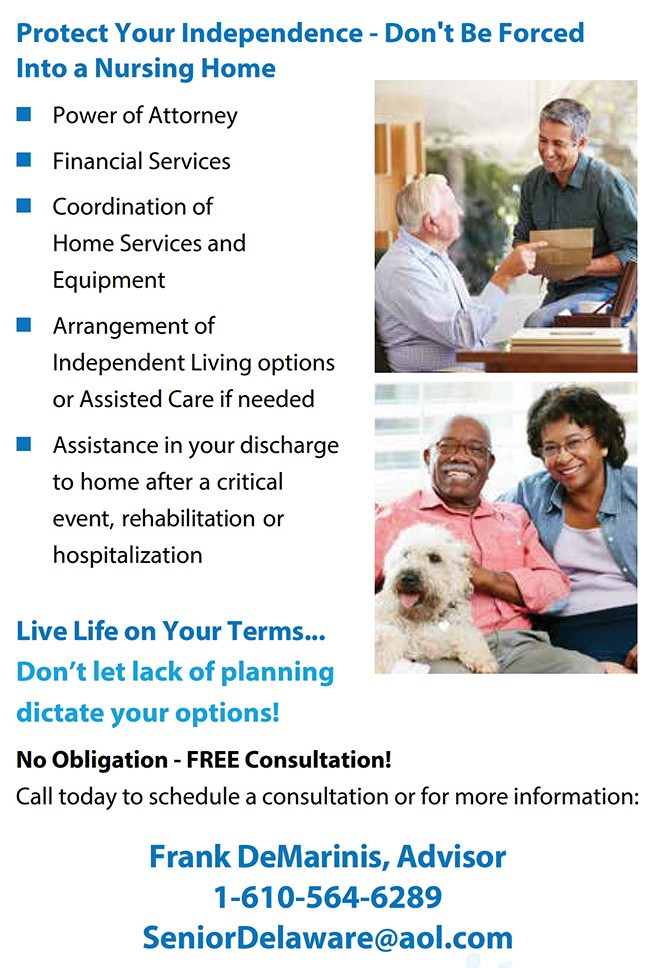Planning For The “What If?”
 By Frank Demarinis
By Frank Demarinis
We often write about advantages of estate planning, including wills, trusts and power of attorney planning; essentially, preparing for the “what if?” This month I’d like to share the “why?”
In addition to being a Certified Senior Advisor, I’ve been a licensed nursing home administrator the past 20 years. I’ve witnessed seniors lose everything in a medical crisis. Without a healthcare advocate, a physician order indicating lack of safety at home resulted in long-term nursing home confinement. I’ve been witness to insurance policies being cancelled due to a missed premium payment while hospitalized and evictions from residences.
The cornerstone genesis inspiring our non-profit began with “Bob,” a patient at my skilled nursing facility 17 years ago this month. Bob suffered from a stroke with aphasia, unable to speak. We didn’t have his physical address; no family was indicated and we didn’t have a safe discharge plan. He would vault from his wheelchair and run for the door screaming “dog.” His hallucinations became worse; he even tried to “bark” at staff. Weeks went on and he was being treated with antipsychotics. The owner from his trailer park eventually came indicating he was searching every local nursing facility for him. I asked if we could have access to the residence for clothing and personal items as he likely would not return. When I arrived, I will never forget what I saw . . . Bob’s “hallucination,” a beautiful German Shepherd deceased from lack of food and water. She tried to chew her way through the paneling and expired with one paw out the aluminum siding. It was a personally enlightening and unfortunate reflection regarding the healthcare system and a calling for me to do more for the at-risk seniors.
We often do not want to think about the “what if?” but it happens every day. Ask yourself: If a medical crisis occurs, who pays the bills, mows the lawn, feeds the pets and, in some cases, cares for a dependent loved one that is dependent on our care? We may have friends, neighbors and even family, but without appropriate estate planning, no one has authority to step in if a medical crisis presents itself.
How can one prepare/safeguard against the “what if?”
Power of attorney
A power of attorney can be effective upon incapacitation. It is a negotiation between a parent and adult child. This negotiation can include a third party to mediate the process or serve as an objective party such as a resource agency like Senior Advisors of Delaware. Authority to pay bills and maintain the household in case of emergency would be included in this option.
Healthcare proxy
To ensure appropriate decisions are made in the event of a medical crisis, a healthcare Proxy is essential in advocacy for direction of care. Whether the assignment is a trusted family member or Senior Advisors, LLC, we document client’s healthcare directives and ensure posting to the Delaware Healthcare network.
Representative payee
This is a person appointed to manage Social Security, Veterans’ Administration or other state/federal benefits. Having a POA alone does not enable someone to change one’s SSA Benefits. Resource help can be offered to pursue this option.
Revocable trust
A revocable or “living” trust can be set up to hold an older person’s assets, with a relative, friend, financial institution or agency serving as trustee.
Senior Advisors of Delaware, LLC non-profit program assists in all of these alternatives. We partner with a multitude of attorneys and clinicians to assist in our outreach and resources. Medically “at-risk” and seniors over 85+ can receive Grant Assistance for Healthcare Emergency Proxy and Durable Power of Attorney. Call us for a free consultation, Frank Demarinis at 800-564-0173.
1-800-564-0173


